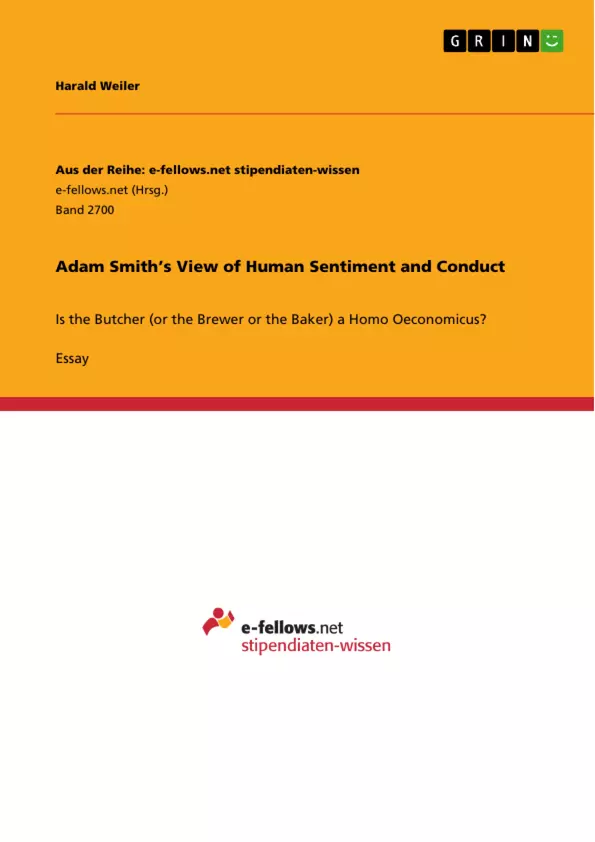„How selfish soever man may be supposed, there are evidently some principles in his nature, which interest him in the fortune of others, and render their happiness necessary to him, though he derives nothing from it except the pleasure of seeing it” is the first sentence of Adam Smith’s Theory of Moral Sentiments. Despite Smith’s repeated emphasis on the importance of sympathy as a fundamental characteristic of human nature, Smith is often only associated with the idea that individuals are driven solely by their self-interest. The reason for this association is that self-interest seems to be the dominant motivator for human behaviour in Smith’s book The Wealth of Nations. As a result, Smith’s idea of man is often seen as a first draft of the self-interested homo oeconomicus used in modern economic analysis.
This paper will explain Smith’s much more comprehensive view of human nature, analyse how the ethics and moral aspects of the TMS and the self-interest of the WN fit together and compare Smith’s idea of man to the concept of the homo oeconomicus in modern economics.
Inhaltsverzeichnis (Table of Contents)
- The modern homo oeconomicus and Adam Smith's idea of man
- Self-interest and sympathy in the work of Adam Smith
- The interaction between Smith's human characteristics
- Concluding remarks concerning Smith's ideas and the homo oeconomicus
Zielsetzung und Themenschwerpunkte (Objectives and Key Themes)
This text aims to provide a comprehensive analysis of Adam Smith's view of human sentiment and conduct, comparing his ideas with the modern concept of the homo oeconomicus. The text examines the interplay between self-interest and sympathy in Smith's work, emphasizing the crucial role of both in shaping individual behavior and societal interactions.
- The homo oeconomicus model in modern economics
- Adam Smith's concept of human nature in the context of self-interest and sympathy
- The relationship between self-interest and sympathy in Smith's work
- The compatibility of Smith's ideas with the homo oeconomicus model
- The “Adam-Smith-Problem” and its resolution
Zusammenfassung der Kapitel (Chapter Summaries)
The first chapter explores the basic assumptions of the homo oeconomicus model in modern economics. It highlights the key tenets of rationality, self-interest, and utility maximization, contrasting this model with Smith's more nuanced view of human nature.
Chapter two delves into the central themes of self-interest and sympathy within Adam Smith's work. It discusses the role of self-interest as a powerful motivator in human interactions, while also emphasizing the importance of sympathy and its implications for social behavior.
Chapter three further examines the interplay between self-interest and sympathy in Smith's writings, highlighting how these two sentiments work in tandem to shape individual actions and societal outcomes. It explores the debate regarding the relative importance of each principle and emphasizes the need for a holistic understanding of Smith's concept of human nature.
Schlüsselwörter (Keywords)
This text focuses on the concepts of self-interest, sympathy, and the homo oeconomicus. It examines Adam Smith's writings, particularly *The Theory of Moral Sentiments* and *The Wealth of Nations*, and explores the “Adam-Smith-Problem” as well as the modern understanding of Smith's ideas in the context of economic theory.
Frequently Asked Questions
What is the "Adam-Smith-Problem"?
The "Adam-Smith-Problem" refers to the perceived contradiction between Smith's "Theory of Moral Sentiments" (focusing on sympathy) and "The Wealth of Nations" (focusing on self-interest).
How does Adam Smith define sympathy?
Smith views sympathy as a fundamental human principle that makes the happiness of others necessary to an individual, even if they derive nothing from it but pleasure.
How does Smith's view differ from the modern "Homo Oeconomicus"?
While the Homo Oeconomicus is strictly rational and self-interested, Smith’s concept of man is more nuanced, incorporating moral sentiments and social connectivity.
Is self-interest the only motivator in Smith's economic theory?
No, although self-interest is a dominant motivator in "The Wealth of Nations," it operates within a framework of moral constraints and social sympathy described in his earlier works.
What are the key tenets of the Homo Oeconomicus model?
The key tenets are perfect rationality, consistent self-interest, and the maximization of individual utility.
- Citar trabajo
- Harald Weiler (Autor), 2017, Adam Smith’s View of Human Sentiment and Conduct, Múnich, GRIN Verlag, https://www.grin.com/document/414455



